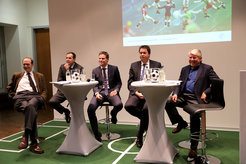The Handball Rule in Soccer – What Is “Justice” in Sports?
Soccer rules are seldom the subject of legal research. In principle, they should be amenable to easy application and generally not require any specialized legal training. Yet some rules are particularly complicated. This holds true, for instance, as regards the rule concerning handling the ball (Rule 12 of the International Football Association Board), which was recently revised in order to make the criterion of “intention” more workable.
But does this rule truly provide referees with a practical framework for their decisions? Is it free of internal contradictions? These questions were addressed in this year’s Hamburg Forum on International Sports Law. Moreover, the symposium explored the general question of how the notion of “justice” should be understood and achieved in sports. Does, for example, the video review procedure lead to greater justice?

Reinhard Zimmermann, Managing Director of the Hamburg Max Planck Institute for Comparative and International Private Law, outlined the area of inquiry in his opening remarks, quoting in the process a variety of recent newspaper headlines (“The brainless handball rule”; “A black day for the handball rule”; “Handball: this is toxic”). In German soccer stadiums, each week vigorous discussions arise as to whether the contact between the ball and a player’s hand or arm constituted a “handball”. Similarly, the video review procedure has been a regular subject of criticism (“Video review harms the image of referees”; video review is making soccer “steadily more clinical”). Nonetheless, Zimmermann also highlighted the conundrum in reconciling the increasingly complex rules and the decreasing tolerance for mistakes with the nature of soccer as a sport that ultimately hinges in no small part on fluke and fortuity.
Subsequently, Hans Christoph Grigoleit, from the Ludwig-Maximilians-Universität München, subjected the handball rule to rigorous theoretical analysis. He described the context and the underlying (vorpositive) framework of the rule; he sketched out the element of intention under the lens of the recently formulated presumptions and examples provided by the rule; and he examined the prescribed sanctions for the handball rule’s violation as well as their appropriateness. The main address of Professor Grigoleit was followed by supplementary comments offered by Felix Byrch (DFB and FIFA referee – and lawyer), Christian Deckenbrock (Vice-president of the German Hockey Federation, and also lawyer), and Gunter Gebauer (sports academic, philosopher, and linguist), thus offering the perspective of practitioners (who apply and formulate sports rules) as well as that of sports philosophers.
These short contributions as well as the lively discussion led by Ulrich Becker, Director at the Max Planck Institute for Social Law and Social Policy in Munich, made very clear the tension between, on one hand, the encroachment of legal-style review and, on the other, the intuition and speed necessarily associated with a referee’s decision. Ultimately, an athlete must be prepared to accept – alongside victory and defeat – the rulings of the referee. Presently this often seems to be lacking in soccer. Here, the just-completed Rugby World Cup offers a notable counterexample.
